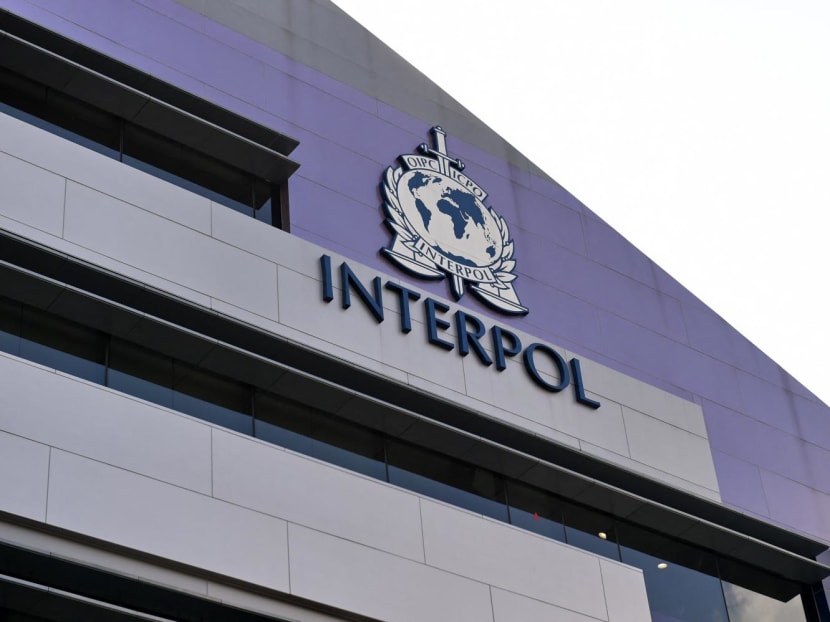Interpol warns of ‘global trafficking crisis’ involving job scam victims, as international conference kicks off in S’pore for first time
SINGAPORE — Interpol has issued a global warning on the growing trend of large-scale human trafficking, as it held a three-day conference with police chiefs from around the world for the first time in Singapore starting Wednesday (June 7).

A view of Interpol’s Global Complex for Innovation in Singapore, where the three-day Heads of National Central Bureaus annual meeting will take place from Wednesday (June 7).
- Interpol issued a global warning on the increasing trend of large-scale human trafficking
- The organisation said that trafficking hubs have been identified in more Asian countries apart from Cambodia, Laos and Myanmar
- The first victims were from Asia, but now come from as far as South America, East Africa and Western Europe
- Interpol's warning came amid a three-day conference for police chiefs from around the world, which is held in Singapore for the first time
SINGAPORE — Interpol has issued a global warning on the growing trend of large-scale human trafficking, as it held a three-day conference with police chiefs from around the world for the first time in Singapore starting Wednesday (June 7).
In such cases, victims were lured through fake job ads to online scam centres, and were then kidnapped and forced to commit financial crimes.
Interpol said that new research showed that the modus operandi is escalating rapidly and has taken on a “new global dimension”, prompting the organisation to issue an Orange Notice to its members, signifying a serious and imminent threat to public safety.
Online scam centres were initially concentrated in Cambodia, with trafficking hubs later found in Laos and Myanmar.
These trafficking hubs have now been identified in at least four other Asian countries, Interpol said in a media statement on Wednesday.
It did not name these countries, but added that the same modus operandi is also being replicated in regions such as West Africa, where "cyber-enabled financial crime" is already prevalent.
The geographical diversity of the victims has also significantly increased.
“While initial human trafficking victims were Chinese-speaking, drawn from China, Malaysia, Thailand or Singapore, victims have since been trafficked to the region from as far afield as South America, East Africa and Western Europe,” Interpol said.
TODAY has reached out to Interpol for more details on the victims from Singapore.
In October last year, Law and Home Affairs Minister K Shanmugam said that the Singapore police were monitoring the potential human trafficking of scam victims who were lured by syndicates to "work" in neighbouring countries such as Cambodia, Laos, Myanmar and Thailand.
In a written reply to a parliamentary question, Mr Shanmugam said that a report had been filed involving potential Singapore victims kept against their will in Myanmar to work for scam syndicates there.
However, this report was based on second-hand information. The Singapore police referred the report to the authorities in Myanmar for assistance.
MODUS OPERANDI
Interpol said that reports on the crime first emerged in 2021.
Criminal groups posted false promises of lucrative job opportunities on social networks and recruitment sites, and then kidnapped and detained the unsuspecting applicants in inhumane living conditions.
The victims were subjected to forced labour, extortion, beatings, torture, rape and even purportedly organ harvesting in some cases.
They were then forced to commit crimes, mainly online fraud.
These criminal groups used schemes such as investment fraud, romance scams and frauds linked to cryptocurrency investing and online gambling.
Covid-19 widened the victim pool, with online fraud spiking as digitalisation rates rose during pandemic lockdowns, forcing most activities to be performed almost exclusively online, it added.
The pandemic had also caused many people to be jobless, resulting in desperate attempts for work opportunities.
Online fraud victims targeted by the scam centres were initially mainly of Chinese origin, but are increasingly located in North America, Europe and other parts of Asia.
Interpol said that these scam centres have become more sophisticated.
“Recent developments in artificial intelligence and large language models like ChatGPT are also reportedly being leveraged by the online scam centres," it said.
“At the same time, language translation software is used to target victims in countries not represented by trafficked workers.”
Interpol's secretary-general Jürgen Stock said that what began as a regional crime threat has become a "global human trafficking crisis”.
“Just about anyone in the world could fall victim to either the human trafficking or the online scams carried out through these criminal hubs," he added.
"Much stronger international police cooperation is needed to stop this crime trend from spreading further."
CONFERENCE TO TACKLE ‘COMPLEX AND DEADLY CRIMINAL LANDSCAPE’
Interpol's warning of the growing crime phenomenon came amid a three-day Heads of National Central Bureaus conference in Singapore, which is home to Interpol’s Global Complex for Innovation.
It involves 270 delegates from more than 133 countries who will discuss best practices to counter cybercrime, terrorism and other emerging criminal trends.
The conference will focus on addressing challenges posed by a "complex and increasingly deadly criminal landscape", the organisation said in a separate media statement on Wednesday.
“As criminal networks exploit advances in emerging technology, the conference will serve as a platform to encourage greater cooperation in developing effective strategies to combat these threats at the regional and global level,” it said.
In its statement, Interpol gave examples of various operations it has conducted to bring down crime groups.
Its recent "Operation Trigger IX", which took place between March 12 and April 2, primarily targeted firearms trafficking routes and organised crime groups in Latin America.
The three-week operation resulted in the seizure of 8,263 illicit firearms and the recovery of drugs worth US$5.7 billion (S$7.7 billion).
It also highlighted the close links between different forms of criminality, Interpol said.













